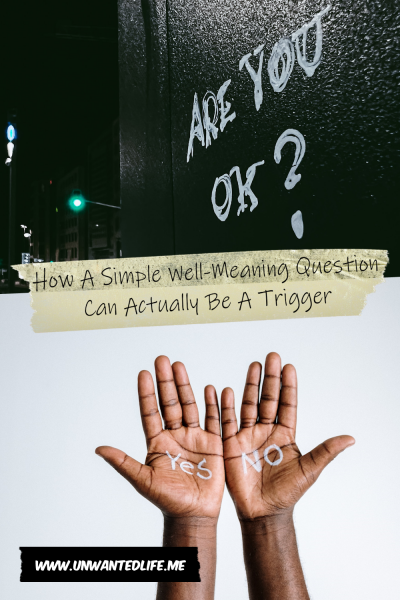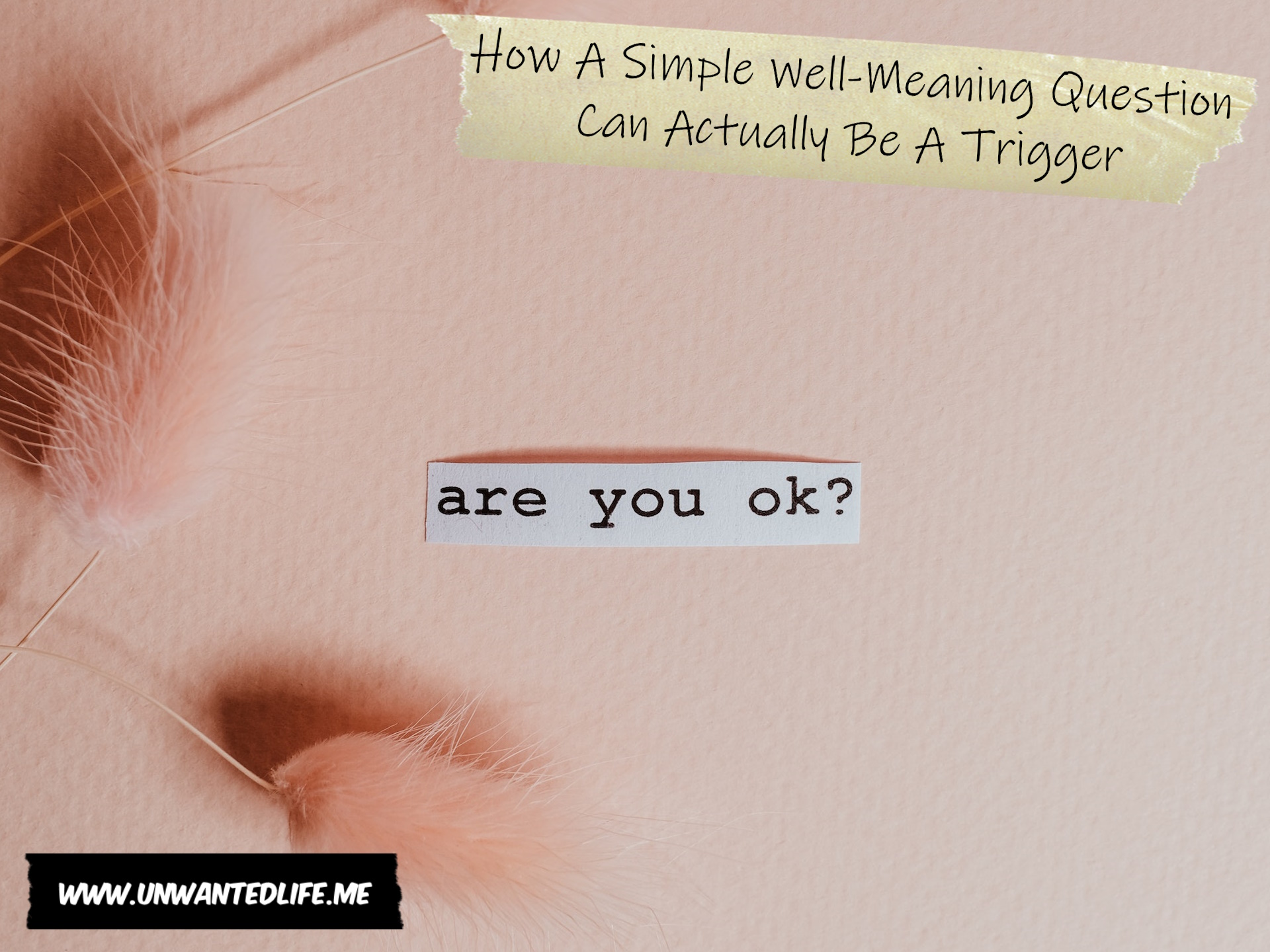Until recently, I wasn’t aware of anyone else who found that being empathic towards them made their anxiety worse, not until my client told me a story similar to mine. As a result, I thought I’d write this article on how a well-meaning question can actually be a trigger for some of us with anxiety. I hope you find this article insightful.
What Is Anxiety?
Like all emotions, they play an important role and we all experience them, and anxiety is no different. Anxiety is a perfectly natural human response when we feel under threat and can be experienced through physical sensations, thoughts, and feelings (Mind).
Anxiety is a future-oriented state that’s meant to help prepare us for the possible and potential negative outcomes (Craske et al., 2011). Unfortunately, anxiety can also develop into a clinical mental health issue.
Anxiety Triggers
What may trigger anxiety can vary from person to person. It can be an experience or learned behaviours from others, which is often how phobias are passed through generations. But here’s a list of some of the common triggers for anxiety.
- Childhood experiences.
- Past experiences.
- Abuse.
- Stress.
- Being overworked.
- Debt.
- Health issues.
- Caffeine.
- Social events.
- Personal triggers.
A Well-Meaning Question
While preparing to write this article, I searched to see if anyone else had discussed this unsuspecting trigger, and I only came across one Quora post. So it may be a rare personal trigger that only a few of us have experienced. But, I think it’s important to talk about it anyway, in case this is the case for someone reading this or for someone supporting someone with anxiety.
The worst thing about this personal trigger is that it comes from a place of concern for others, but it has the opposite effect of what’s intended. For my client, they found when they told their partner or their parent that they were feeling anxious, they’d feel worse, rather than better.
Because this didn’t make much sense, as these loved ones are very supportive of the client, I dug into this and we talked through what would happen in detail in such situations. It was this discussion that brought to light that it wasn’t telling them that they were feeling anxious that caused their anxiety to increase, but them asking a well-meaning question, “Are you ok?” several times after the client told them they were anxious. It was this well-meaning question that caused their anxiety to grow.
It clicked for me as the cause, because of my own experience. So, when I saw the connection, I shared my hypothesis with the client, and suddenly they realised it too. We could then come up with a simple way to remedy the situation, which I’ll talk about in the next section.
Although my client’s experience clicked with what happened to me, are experiences of how a well-meaning question became our triggers aren’t the same. Mine formed because of my drug-induced psychosis, creating my anxiety disorders because of what happened while I was out clubbing. I felt fine, but being asked if I was ok repeatedly, in such a short space of time by several people, caused me to doubt my reality.
At the time, I thought I was fine, but being asked if I was ok repeatedly caused me to think they were aware of something I wasn’t, and boom, I had a psychotic break.
For others, it might be different. Asking this well-meaning question suggests that the person doesn’t look ok, which reinforces negative thoughts about appearing visibly anxious. However, for me, being asked if I’m ok causes me to doubt my reality, which can trigger my anxiety. It seems my client has a similar response when asked this as well.
Being asked if they’re ok while feeling anxious may feel like it’s drawing extra attention to their anxiety symptoms, like fidgeting or shaky hands that they hoped weren’t noticeable. This could then increase feelings of self-consciousness. Or it could be that if they say they’re not ok, the situation may become awkward for everyone involved, and thus they don’t want to answer or want to lie to avoid the awkwardness. Another reason could be that it forces the person to evaluate how they feel in the moment, which they may have been trying to avoid.
If A Well-Meaning Question Is Your Trigger, Here’s What You Could Try
If being asked how you are doing is an anxiety trigger for you, then when it comes to your friends, family, work colleagues, etc. who know you experience anxiety, there is a simple way to avoid that happening. Talk to them.
It’s that simple, just talk to the people in your life and tell them how being asked if you’re alright while you’re feeling anxious can actually make your anxiety worse. They’re only asking if you’re ok because they’re concerned about you, but they’re not to know that this well-meaning question is making things worse for you. They’re also not going to know that this well-meaning question is making your anxiety worse if you don’t tell them. Unless they read this article by chance and talk to you about it, which seems unlikely.
If these people care for you or are just generally kind people, which they will be if they’re asking if you’re ok in the first place, then they won’t be offended if you tell them that this well-meaning question actually makes things worse for you. You can then either talk about what they could do instead, or you can just make suggestions, whichever you feel more comfortable doing.

Summary
Don’t stop asking people if they’re alright if you feel they might not be, just because of this article. Keep doing that and try to help others. Kindness is important. Just be aware that in rare cases, a well-meaning question, such as asking if someone is ok, could be triggering.
This well-meaning question often comes from a place of care. But for someone with anxiety, it can provoke additional unease. Thus, the use of gentle, open-ended questions and creating a safe space for them to share can be more helpful instead.
If you have a loved one that you know has anxiety, ask them if asking such a well-meaning question is something that can make their anxiety worse or not. Then find out what you can do, or not do, instead. It might be the case that you don’t need to say or do anything, but rather just be there should they need you.
As always, leave your feedback in the comments section below. Also, please share your experiences with being triggered by a well-meaning question or behaviour in the comments section below as well. Don’t forget, if you want to stay up-to-date with my blog, then sign up for my newsletter below. Alternatively, get push notifications for new articles by clicking the red bell icon in the bottom right corner.
Lastly, if you’d like to support my blog, you can make a donation of any size below. Until next time, Unwanted Life readers.
References
Craske, M. G., Rauch, S. L., Ursano, R., Prenoveau, J., Pine, D. S., & Zinbarg, R. E. (2011). What is an anxiety disorder?. Focus, 9(3), 369-388. Retrieved from https://focus.psychiatryonline.org/doi/pdf/10.1176/foc.9.3.foc369 and https://focus.psychiatryonline.org/doi/full/10.1176/foc.9.3.foc369.


Nice post 🖊️
Thanks
I don’t think this could trigger me but its good to know about this. I’m sure people will find this helpful. Thank you for sharing!
Thanks for commenting
Very informative! Anxiety is something we all have dealt with at least once in our lifetime.
Anxiety does have its uses so most people likely experience it fairly regularly. However, that level anxiety is different to the clinical kind of anxiety, and although I lot of people might experience that during their life, hopefully it doesn’t become a significant life changing version of anxiety
Can not having enough to do cause anxiety? Great post. I learn a lot every time you post.
It certainly can be. For some people with anxiety, it’s often their thoughts that cause an anxiety episode, and thus they like to keep themselves busy to avoid the thoughts triggering their anxiety. This is something that is shared with people who have depression as well. Thanks for commenting
This is very interesting I had never considered this before.. Good to be mindful of this! Thanks for sharing!
Thanks for commenting
Sadly, I am not really good at asking people if they are okay cause if make me overthink; but I am working on it.
Overthinking is a common problem people can develop, often because of self-esteem and confidence issues. I hope you’re able to overcome this issue
I do also have this trigger and also there’s another phrase that is also a trigger.